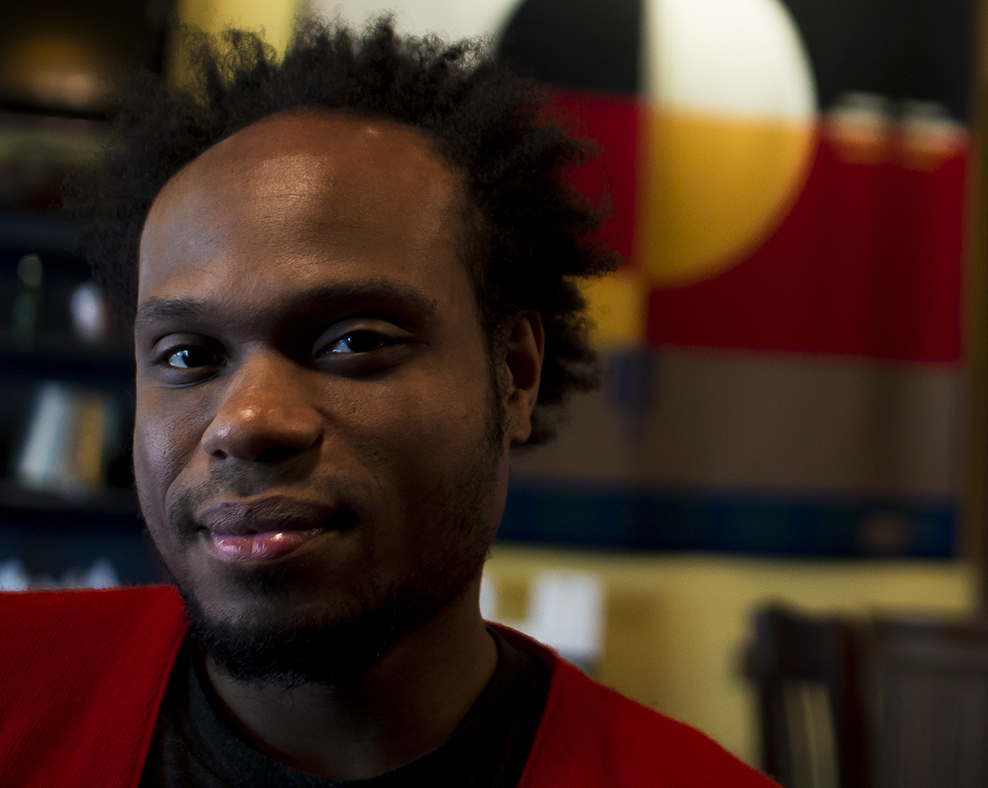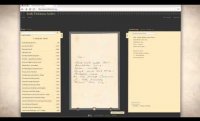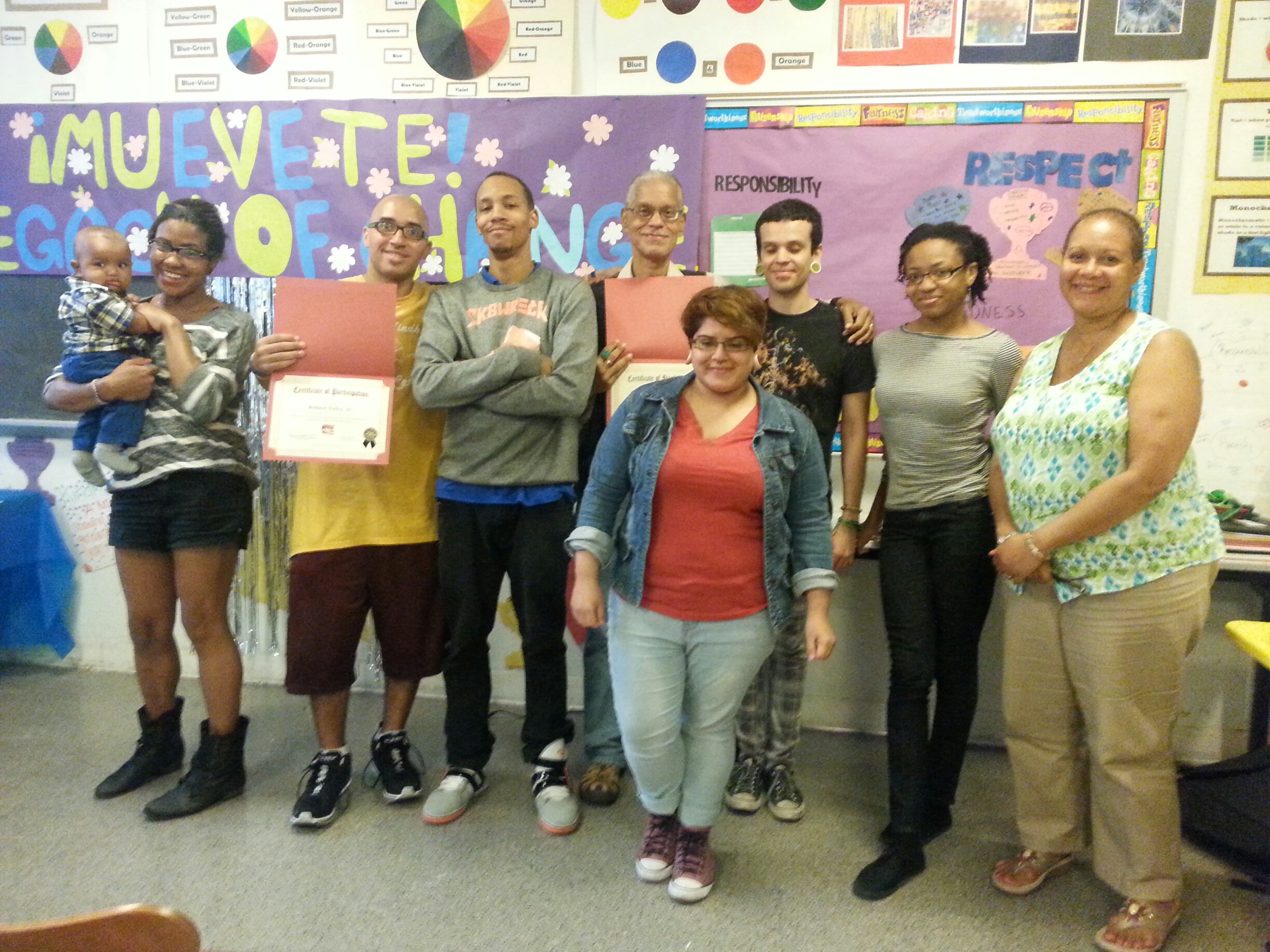P&W-funded Jamaal May is a poet from Detroit, MI, where he taught poetry in public schools and worked as a freelance audio engineer and touring performer. His poetry won the 2013 Indiana Review Prize and appears in journals such as Poetry, Ploughshares, and The Believer. Jamaal has earned an MFA from Warren Wilson and fellowships from Cave Canem and Bucknell University. His first book is Hum (Alice James Books, 2013), and he is founder of the Organic Weapon Arts Chapbook Press.
 More than half of my small income is generated by visiting schools, libraries, bars, backyard birthday parties, etc. Some of these have been soul-sucking experiences I would’ve passed on if rent didn’t depend on it. This fall, my income is entirely dependent on paid readings, which makes it tempting to say yes to everything. Here are some things we should all consider before saying yes.
More than half of my small income is generated by visiting schools, libraries, bars, backyard birthday parties, etc. Some of these have been soul-sucking experiences I would’ve passed on if rent didn’t depend on it. This fall, my income is entirely dependent on paid readings, which makes it tempting to say yes to everything. Here are some things we should all consider before saying yes.
Last Minute
A last minute request for a first time or onetime event is usually a bad sign. This is especially true if the event isn’t poetry related: “I just realized today that I need a poet for my company’s end of the quarter rainmaker soiree. We don’t offer an honorarium, but you can sell books.”
Last minute does not necessarily translate to poorly organized. Consider whether the organizer had another reader cancel or had to take over for someone else. Even the most well-run events are powerless to a poet catching the plague.
Free Gigs That Rock
Some of the best reading experiences I’ve had were for organizations that either couldn’t pay me or barely could. These readings are usually easy to spot. Organizers will be upfront about what they can or can’t pay, they’ll be enthusiastic about your work, and you’ll get a generally good feeling from the person contacting you.
Free gigs that absolutely do not rock will usually feel like they’re doing you a favor. “There’s a microphone here. You’re welcome.”
What Is Your Fee?
This question used to fill me with panic. How much are my poems worth? Too high and I might price myself out of the gig. Too low and I might not be able to replace my broken glasses. What I do now is lean on candor. I tell the organizer the upper range of what I typically get for similar events, admit that I have a sliding scale, and ask them not to lowball me. It’s rare for a decent person to read “don’t screw me please” and still try to screw you.
Bizarre Events and Locations
Someone thinks, “I like poetry. I like corn dogs. We should do poetry at the state fair next to the corndog tent!” It keeps happening, though poetry is an intimate experience that requires attention. A situation where people will accidentally stumble across your poem on their way to the tilt-a-whirl is not ideal.
If you can be sure there is a built-in audience coming to an atypical event specifically to see poems, it can be a good time. Also, some events use the unexpected presence of poetry as a feature, such as Pop Up Poets and Kiss Punch Poem. The difference is that these are well thought out, ongoing projects.
Good Organization Accidentally in League with Hacks
This is one of the leading causes of poorly organized readings in bizarre locations. I’ve seen this paradigm enough that I run the other way when the following list of factors present themselves: An organization I trust is tapped by another organization with a big name, usually a corporation or respected institution, to provide poets, last minute, for a one-off event. What happens here is a lazy employee at Massivecorporateco is charged with filling a program they don’t want to be organizing in the first place. They contact a poetry-related organization to get free entertainment. A bad time is had by all.
Someone Who Loves Your Poetry Doesn’t Realize Their Friends Won’t
Sometimes an audience member will be so enthralled with your poems they won’t be able to fathom their frat brothers not being similarly wowed by you. So they scrape together some university funds and find a dank room for you to read in. Their bros and sister sorority show up because they’re socially obligated to. You are a chore to survive before the drinking starts. The flipside is that there’s pretty much always someone in that kind of crowd that will connect to your work. They didn’t realize they would until you showed up. I often think of going into these spaces that we don’t fit as part of the job. It’s different from the corndog tent because they’re actually a captive audience. If you have them present and listening, do your job and make it damn hard for them to remain unchanged.
Photo: Jamaal May. Credit: Tarfia Faizullah.
Support for Readings/Workshops events in Detroit is provided by an endowment established with generous contribution from the Poets & Writers Board of Directors, and others. Additional support comes from the Friends of Poets & Writers.








 More than half of my small income is generated by visiting schools, libraries, bars, backyard birthday parties, etc. Some of these have been soul-sucking experiences I would’ve passed on if rent didn’t depend on it. This fall, my income is entirely dependent on paid readings, which makes it tempting to say yes to everything. Here are some things we should all consider before saying yes.
More than half of my small income is generated by visiting schools, libraries, bars, backyard birthday parties, etc. Some of these have been soul-sucking experiences I would’ve passed on if rent didn’t depend on it. This fall, my income is entirely dependent on paid readings, which makes it tempting to say yes to everything. Here are some things we should all consider before saying yes.


